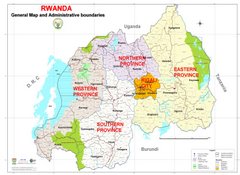
Kigali: The French president's visit is historic but a true reckoning of the role of French policy in the genocide may never be possible. During his whistle-stop visit to Rwanda, Nicolas Sarkozy made no apology for the role of France in the genocide of 1994.
A carefully worded acknowledgement that mistakes had been made, not just by France, was as far as he went. The lack of apology was no surprise. No matter the weight of evidence that has accumulated, no forgiveness is being sought – and none will be offered. The issue is simply off the agenda.
The visit, the first by a French president in 26 years, signifies the resumption of diplomatic relations severed four years ago when a French judge accused the current president of Rwanda, Paul Kagame, of involvement in the assassination of his predecessor – thereby blaming him for triggering the genocide of the Tutsis and moderate Hutus. The judge had issued international arrest warrants for nine Rwandan government officials said to have been responsible. One of those officials, Rose Kabuye, who was subsequently arrested and later released in Germany, has this week been organising the Sarkozy visit. The French judge's work is now largely discredited, with his main witnesses having retracted their testimony.
Sarkozy today visited the national memorial at Gisozi where an estimated 250,000 people are buried. The genocide lasted three months, during which time an estimated 1 million people were murdered; it had been a planned and political campaign intended to eliminate a minority, the Tutsis, to avoid power-sharing and create a "pure Hutu state". France had been the one country that had stood any chance of preventing what happened. For years France had supported Rwanda's Hutu dictatorship; the French military had armed and trained the killers and when the genocide began there were French officers embedded in the elite Rwanda army units whose troops in the first hours had eliminated Rwanda's political opposition. France had given tacit approval to the Hutu Power extremists who had formed a rogue government that would eventually create a society based on genocide.
When the Sarkozy visit was first announced, the French foreign minister, Bernard Kouchner, lost no time in saying it was time to "turn the page". The Rwandan foreign minister, Louise Mushikiwabo, seems to agree. "We have to move on," she said. Kouchner, when asked recently about the prospect of an apology, had said: "More time is needed … to understand every detail … this work is indispensable." But a true reckoning of French policy may never be possible, for the historic visit surely signifies an end to further embarrassment. In all probability, the relevant archives will probably remain firmly under lock and key. French policy was particularly secretive – the preserve of President François Mitterrand and his "Africa Unit" comprising intelligence operatives, mercenaries, businessmen and senior military officers. Its policy was unaccountable to either the French parliament or the press.
President Sarkozy and Bernard Kouchner are familiar with the Rwandan story. In 1994, Kouchner had played the role of intermediary between the French government and the force commander of the UN peacekeepers, Lieutenant General Roméo Dallaire. In one visit to Kigali, Kouchner had negotiated with one of the military leaders, Colonel Théoneste Bagosora, trying to secure the release of Rwandan orphans to fly them to Paris in time for the TV news. Kouchner had promised Bagosora that the release of the children would be an international "public relations coup".
Sarkozy was a government spokesman, and in June 1994 – after two months of widespread massacres – he appeared on French television to explain how France was going to intervene with the military Operation Turquoise in order to establish security zones to protect fleeing refugees. Sarkozy may not have been fully aware of the operation's secondary purpose, for it would ultimately provide an escape route for the Hutu Power killers – the army and the Interahamwe militia – allowing them to establish bases in the neighbouring Democratic Republic of Congo. The hundreds of genocide suspects currently in Europe today have the French military to thank for their freedom.
So far, the only country to have held a credible inquiry into the circumstances of the genocide is Belgium whose troops – the only effective UN contingent in Rwanda – had been hastily withdrawn when the killing began. Ten years ago, the then prime minister Guy Verhofstadt had gone to Kigali and begged the people of Rwanda for forgiveness. "I accept the responsibility of my country," he said.
We are unlikely to ever hear the same from Sarkozy.
Linda Melvern is an investigative journalist and author, who worked for several years at the Evening Standard and at the Sunday Times, including on the latter's Insight team. She is also an honorary professor at the department of international politics, University of Wales, Aberystwyth. An expert on the Rwandan genocide of 1994, she has published several books on the subject, including A People Betrayed: The Role of the West in Rwanda's Genocide (2000) and Conspiracy to Murder: The Rwanda Genocide (2004)
Adapted from The Guardian, Photo from PPU

No comments:
Post a Comment